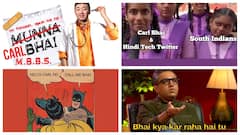Cambridge Dictionary Adds New Definition To Words 'Man', 'Woman' To Now Include Trans People
While the primary definition remains the same, the words 'man' and 'woman' also include transperson in the definitions.

New Delhi: The Cambridge dictionary has added new supplementary definitions for both ‘man’ and ‘woman’ to include anyone that identifies as a gender other than their biological sex.
The Cambridge primary definition for a woman remains unchanged – an adult female human being – it now also reads “An adult who lives and identifies as female though they may have been said to have a different sex at birth”.
Included in the definition are two examples referencing transgender people. One example reads, “She was the first trans woman elected to a national office.” Another example using the updated definition reads, “Mary is a woman who was assigned male at birth.”
Similarly, the definition of a man has been “an adult male human being” and “the human race”, it now includes the definition: “an adult who lives and identifies as male though they may have been said to have a different sex at birth”.
Along with it are two examples: “Mark is a trans man (= a man who was said to be female when they were born)” and “their doctor encouraged them to live as a man for a while before undergoing surgical transition”.
ALSO READ: Faridabad Cop Swallows Money After Being Caught Red-Handed Taking Bribe. Watch Video
These changes were made in October, however, this came to the notice after The Telegraph first reported it on Tuesday.
A Cambridge spokesperson told the Telegraph that the editors carefully studied the usage patterns of the word woman and concluded that the definition is one that learners of English should be aware of to support their understanding of how the language is used.
“They are compiled by analysing a large corpus of English texts (over two billion words in total) taken from all areas of writing and publishing, which allows us to see exactly how language is used.
“We regularly update our dictionary to reflect changes in how English is used, based on analysis of data from this corpus”, the spokesperson told the Telegraph.
Dr Jane Hamlin, the president of the Beaumont Society, a charity that supports transgender and non-binary people, responded to the change in the Cambridge diction and said, “This is such good news. There has been so much misinformation and rubbish written about definitions of ‘man’ and ‘woman’ lately, but these definitions are clear, concise and correct. Congratulations to the Cambridge Dictionary team!”
However, Cambridge isn’t the first to change the definitions, in July, Merriam-Webster added a supplementary definition of “female” that defines the term as “having a gender identity that is the opposite of male”.





































